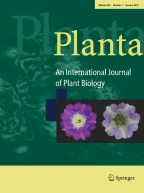Abstract.
Previous work has shown that stomatal opening induced by indole-3-acetic acid (IAA) in epidermal strips of the orchid Paphiopedilum tonsum L. is preceded by a reduction in cytoplasmic pH (pHi) of the guard cells. We now report that Fab fragments of an auxin-agonist antibody (D16), directed against a putative auxin-binding domain of the auxin-binding protein ABP1, induce stomatal opening and decrease guard-cell pHi, as monitored with the acetomethoxy ester of the ratiometric pH indicator Snarf-1. Similar activity was shown by a monoclonal antibody against the same domain. The C-terminal dodecapeptide, Pz152–163 of maize ABP1 (ABPzm1) induced guard-cell alkalinization and closed stomata, as did Fab fragments of a monoclonal antibody (MAC 256) recognising the C-terminal region of ABPzm1. By implicating, for the first time, an auxin-binding protein in mediation of an auxin-dependent physiological response, these findings strongly support an auxin-receptor role for ABP1.
Similar content being viewed by others
Author information
Authors and Affiliations
Additional information
Received: 23 December 1997 / Accepted: 16 January 1998
Rights and permissions
About this article
Cite this article
Gehring, C., McConchie, R., Venis, M. et al. Auxin-binding-protein antibodies and peptides influence stomatal opening and alter cytoplasmic pH. Planta 205, 581–586 (1998). https://doi.org/10.1007/s004250050359
Issue Date:
DOI: https://doi.org/10.1007/s004250050359
